EVERETT, Wash., March 28, 2022 – Esther’s Place is a resource center for women and children in Snohomish County where individuals in need can connect to resources ranging from rehabilitation programs to life skills classes. Whether it be homelessness, addiction, mental illness, or all of the above, the resource center embraces women whatever their situation may be and enables them to overcome their internal struggles.
“Esther’s place is a safe oasis for women in Snohomish County who are experiencing homelessness,” says Snohomish County Councilwoman Megan Dunn. “As we celebrate Women’s History Month and the accomplishments of so many amazing women across the globe, I’m grateful for places like Esther’s Place who help unsheltered women get back on their feet so that they too can tap into their full potential.”
Since 2014, Esther’s Place has served over 64,000 meals and helped over 9,640 women.
“That’s only 9,640 recorded,” says Judy Hoff, Founder of Esther’s Place and its parent organization, the Hoff Foundation. “[There’s] probably more as they come and go.”
How Esther’s Place began
Hoff felt compelled to create a resource center after she witnessed a woman crawl into a dumpster for warmth one night in Everett years ago.
“It was a cold winter, dark night, and I’m going out to the alleyway to get to my car, and there was a woman getting into one of those big garbage cans,” she recalls.
Hoff knew this individual’s name as she worked with women through various ministries before founding Esther’s Place.
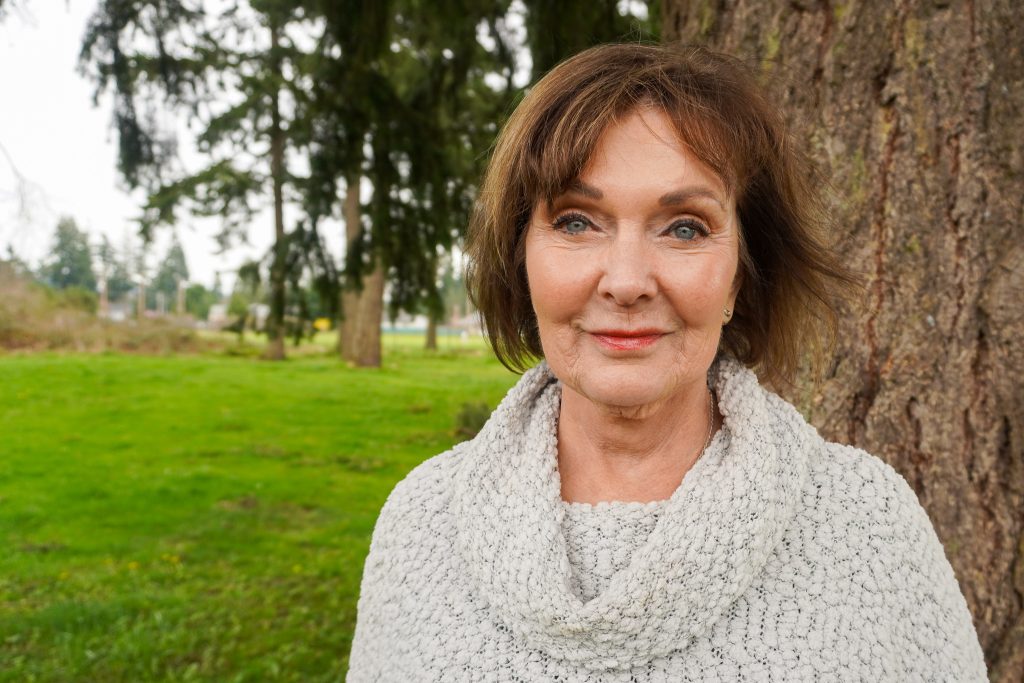
“‘Marry, what are you doing?’ And she said, ‘I gotta get out of the weather. I’m getting into the garbage can to sleep,’” Hoff said, recounting the conversation. “So I got Marry in the car and got her to a place where she could bed down and be safe that night.”
The experience was profound and affected Hoff deeply. “I went home, and I cried, and I prayed, ‘how can I help these women I see all over the place that do not have a home—a place to lay their head without prostituting? How can I help them become who they are made to be—created to be?’” She remembers asking herself. “How can I help them?”
After making a call to a local pastor, Hoff found a space in the First Presbyterian Church’s basement in Everett, where she could shelter and feed women in need, and it became Esther’s Place.
The resource center operated out of that church for roughly seven years, but in August 2021, Esther’s Place moved into a small home just a few blocks away at 3705 Broadway in Everett, Washington.
Why the name “Esther?”
Hoff named the center after a biblical character. “Esther was homeless, and she changed a nation by following God’s vision for her, and she was able to help many, many people,” Hoff explains.
The idea behind this namesake is that every woman at Esther’s Place becomes an Esther. “You’re an Esther because you’re changing your heart, you’re changing your clothes, you’re changing your mind,” says Hoff.
“It’s about transformation and believing in yourself—believing that there is hope for you—that you can have a future; that you’re not stuck because you used to do this or that. You can have a fresh start—and that’s what Esther provided a country, was a fresh start.”
Esther’s Place is more than shelter
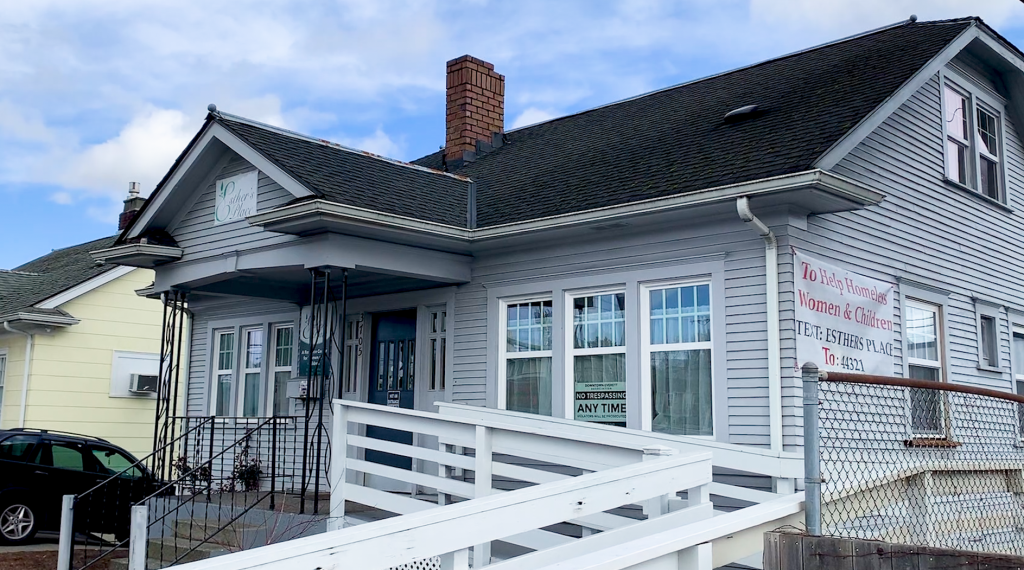
Esther’s Place facilitates the fresh start Hoff mentioned by connecting women to an array of services and resources.
The little house on Broadway is equipped to meet the immediate needs of houseless women. Its small kitchen serves two meals daily, and Esthers can shower and receive clean clothes upon arrival. There is even a space for children on the second floor, complete with books, toys, and crafts.
The center also enables women to make phone calls, set up email accounts, and establish mailing addresses.
Two recent developments on the property are a community garden and a shed out back that Hoff plans on organizing into a clothing distribution center, where incoming Esthers can find new garments.
After meeting the basic physiological needs, the center connects women with doctors, mental health professionals, rehabilitation programs, job preparation services, and even a housing program.
New Creations Communities Housing
Lodging for Esther’s is provided via New Creation Communities, another non-profit that falls under the Hoff Foundation umbrella. Through New Creation Communities, the Hoff Foundation operates “two homes in Snohomish County that provide comprehensive wrap-around support services for 22 women who are escaping homelessness or are at a significant risk of homelessness.”
Hoff, when talking about this state-certified housing program and its services, said, “We partner with the social workers, the police departments in all of Snohomish County, and it’s a program […] that actually offers life skills classes [and] a recovery coach.”
Women need to be clean and sober to enroll in the New Creation Communities program.
Hoff elaborated on resources and partnerships, saying, “We are a partner with every other community resource. So for those community resources that may not have a place to go find the people they want to help, we are that place.”
One such community resource Esther’s Place partners with is Mercy Watch, an Everett-based homeless outreach ministry that provides “basic street medical care, emotional and spiritual support, and needed supplies (socks, blankets, sleeping bags, etc.) to homeless men, women and children surviving in the area.”
Esthers’ Stories
The true value of Esther’s Place is found in the lives it has changed. Two Esthers shared their stories with the Lynnwood Times: Lisa Leonard, 40, from Smokey Point, and Sandra Stringham, 47, who calls Everett home.
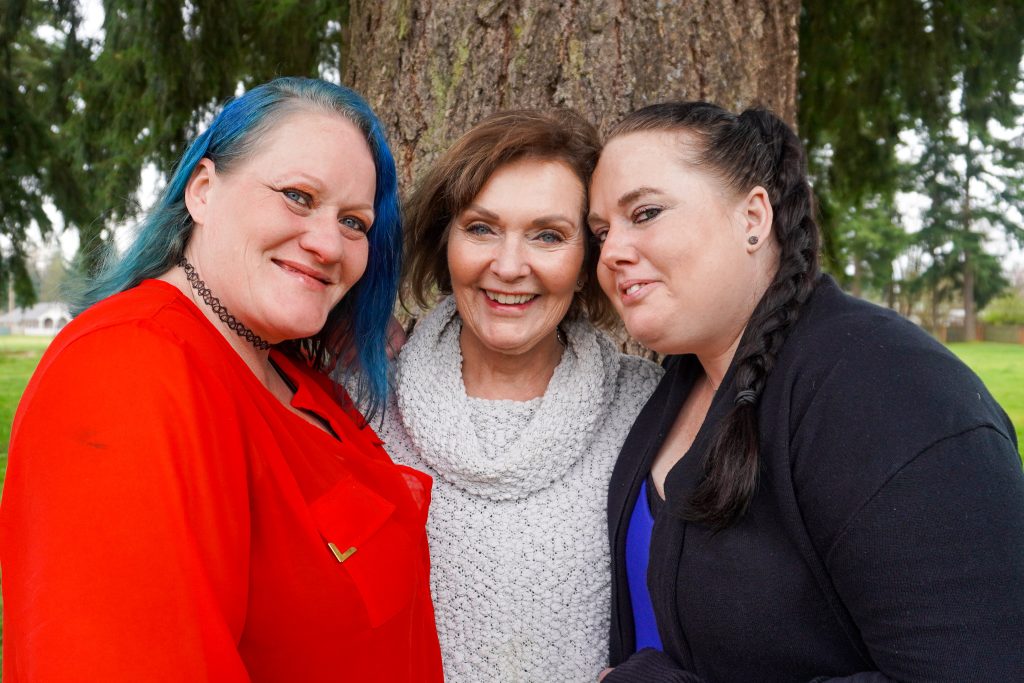
Overcoming active addiction
Before arriving at Esther’s Place, Lisa Leonard struggled with addiction. She grew up using with her family, and between 2019 and 2020, she lost both her parents. “My parents […] were in addiction as well, and I lost them—that was my darkest place,” said Leonard.
The tragic loss of her loved ones exacerbated Leonard’s addiction, and she ended up being without a home. “I was homeless, living in a tent, and a lot of nights I had nowhere to go—not even a tent, and I’d have to walk around just to stay warm,” she recalled.
It was during this time that Leonard felt she was at her lowest. “I was in a dark hole, and I didn’t really even want to see the next day, you know?”
In 2019, Leonard concluded a brief stay at the County’s Diversion Center (another partner of Esther’s Place) and was welcomed at Esther’s Place, where she could connect with treatment and housing.
When she first arrived, Leonard was admittedly apprehensive. “I was nervous, I didn’t know what to expect, or any of that ‘cause I had never been to treatment, let alone moving in, you know, around a bunch of girls,” she explained.
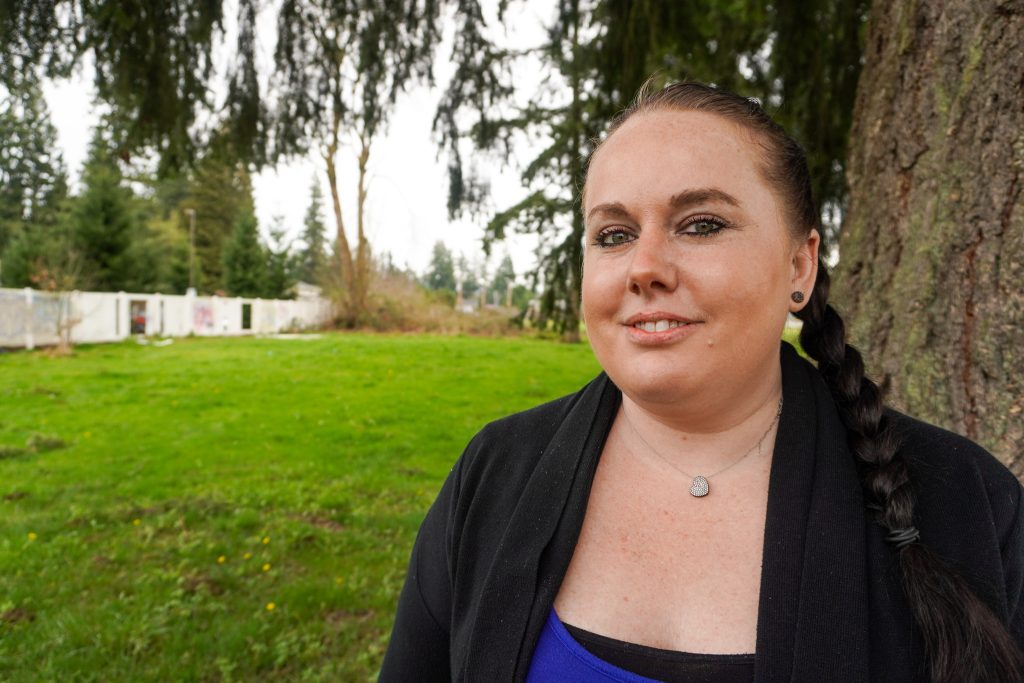
For Leonard, it was “definitely a process” becoming more comfortable and open at Esther’s and New Creation Communities, but now she says that everyone is “truly like family.”
“It’s just nice to be able to talk to these other women when you’ve had similar struggles,” she continued, “and when you’re going through certain things, they can kind of talk you off a ledge or, you know, make you feel better, and that like someone truly understands—that’s been there where you are, and like they truly care about your best interest. It’s a good feeling.”
The acceptance, love, and support Leonard received have helped her make tremendous improvements in her life. Today, she is sober and continues to reside at one of the Hoff Foundation’s housing locations while she works on herself and is even volunteering at Esther’s Place to give back to other women when she can.
In contrast to how she felt years ago, Leonard told the Times, “My life now is so good. I’m happy. I love waking up in the morning. I found God. I mean, my life has been transformed.”
From house arrest to managing houses
Sandra Stringham led a quintessential life as a mother of three, in a happy marriage, and with a successful job. But her life quickly turned when it came to light that the man she had married suffered from an acute case of mental illness.
“I had three kids by a gentleman that ended up being really sick, and he wasn’t okay in his head,” Stringham explained. “And I wanted to do the best I could for him and the kids, and he was using drugs and stuff like that.”
After seven years of trying to keep her family together, her husband’s mental state had deteriorated to the point that he was unable to recognize his own children. “So then, that ended, obviously,” Stringham said. “I told him me and my kids would like him to leave, and that was kind of the last of that—it’s been several years.”
According to Stringham, she became embittered with the situation surrounding her former husband and the lack of financial support for her three kids. “So I got angry, and then I got money-hungry, and I ended up doing some white-collar crimes,” she recalled.
When the law caught up with her, Stringham was put on house arrest for nine months. Feeling isolated in her confinement, she turned to drugs. “I went on house arrest, and I started using,” she recounted.
“[It] started out with pain killers. That was tough. I didn’t feel like I could function, but when I took drugs, it was literally [so] that I could cook and clean and dance and do all these things. And my kids, you know, they just thought I was fun, and they would dance with me or whatever. And it was easy to get everything done.”
In addition to her addiction, Stringham began to suffer from severe social anxiety as a result of her sentencing. “[T]hat house arrest put me into isolation, and by the time I got [out] of that, I didn’t know how to talk to people,” she said. “I was terrified of the world.”
Her struggles continued to cascade as the threat of foreclosure loomed over her home. “I was going to lose my house […] ‘cause nine months of house arrest, you can’t work that much. So I decided to start working, you know, I did the best I could.”
Desperate and scared, Stringham reached out to her probationary officer. “I went to my officer and told her, you know, I need to do something. I have foreclosure notices—it’s going bad.”
“And she said, ‘well, I have this place called Esther’s Place.’ […] I said, ‘I think I can deal with that.’” Through WorkFirst, Stringham began a 9-month work program at Esther’s Place wherein she prepared food and eventually became a resource expert for other women.
When she first arrived at Esther’s Place, Stringham was terrified. “I had a big baseball cap and headphones, and I had sunglasses—I mean, I just didn’t want nobody to talk to me,” she said. “Nobody. Just leave me alone.”
During that time, Stringham would frequently hide in the pantry and have to talk herself into coming out and socially interacting with the other ladies.
“And then I started to, eventually, coming out,” she said. “Eventually talking.”
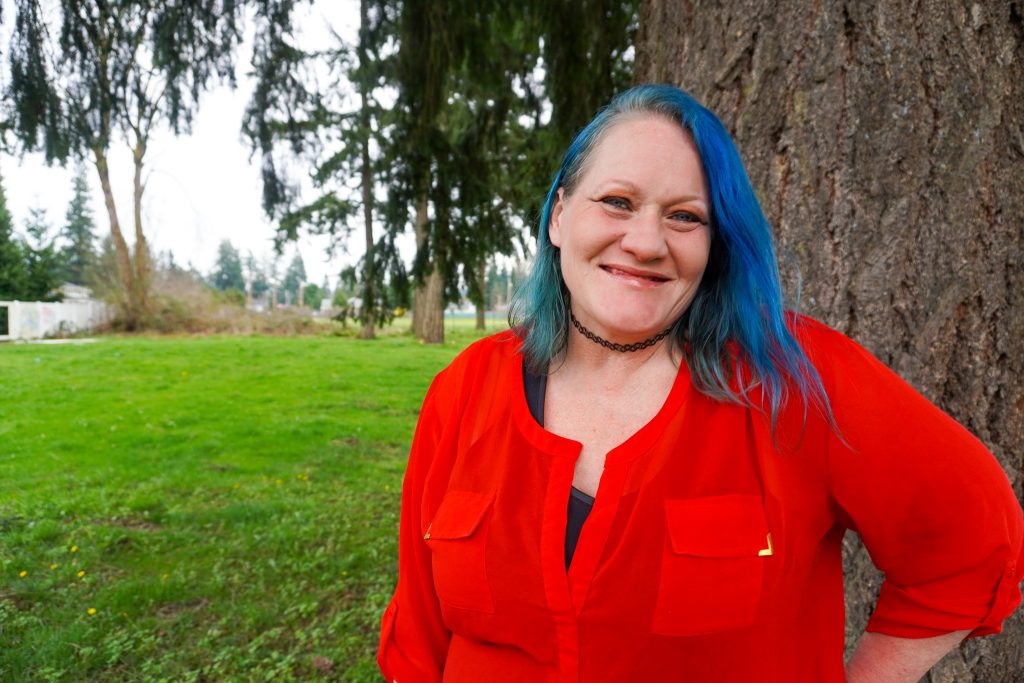
By the end of her nine-month program, she had overcome her social anxieties thanks to the sense of belonging she felt at Esther’s Place. “[B]y the end of it I was literally just like hugging anybody that walked in the door—and the love and all of that and just—it was amazing. It was amazing-amazing.”
Just as Stringham was about to leave Esther’s Place for a job she had lined up elsewhere, Judy Hoff approached her and informed Stringham that she had received several letters from other Esthers who expressed what a loss it would be for Stringham to leave.
“And so she offered me a job my very last day there,” Stringham recalled.
She has been managing three of the Hoff Foundation’s facilities for three years now, including Esther’s Place and the two sober-living houses. Through it all, she managed to keep her home and says she’s giving her children the childhood she always hoped to be able to give them now.
Stringham says her time at Esther’s “definitely changed” her as a person. “I learned a lot of things. I learned how to hold my head up and not judge people, that’s for sure,” she said.
The “Soft Heart” of Judy Hoff
A motif among the women who have been through Esther’s Place is the unwavering love and compassion of Judy Hoff. In Leonard’s case, for example, her trajectory from a homeless addict to a sober volunteer was not without its peaks and valleys. But no matter how high or low she was on her journey to recovery, Hoff never left her side.
“I mean, anyone else would have given up on me a long time ago, and she’s really, truly stuck by me when she probably should have, you know, been like ‘you gotta go,’ but she didn’t, and I thank her for that,”’ said Leonard. “She has a soft heart.”
When asked what it was about Esther’s Place that helped her grow as a person, Leonard said, “The love from Judy, the love that she gives us. She truly cares about us—every one of us.”
Stringham echoed a similar sentiment when recounting her experience at Esther’s. “Judy Hoff has been a huge, huge part of my life,” she said.
Even as they were interviewed by the Lynnwood Times, Hoff offered quiet off-camera support for Leonard and Stringham as they shared the most sensitive challenges of their lives.
For Hoff, love must be paramount at Esther’s Place. “It’s love that lives here,” she says. “We love and accept people at wherever they are, and sometimes it’s real tough because they’re having a hard day from what happened to them out there. But we understand that too, so we love them more.”
Hoff seems to have an intuition for healing broken hearts, and that’s apparent in how she views trauma as the problem behind symptoms like homelessness and addiction.
“Trauma is really the reason they are where they are,” she said when elaborating on what happened to women ‘out there’ before they came to Esther’s.
“It’s not drug addiction—it’s trauma. So the trauma of life has brought them to drug addiction, and then mental illness, and then homelessness, and then here they are, right? But you can reverse that cycle, and they can have a good life. That’s the hope I have for them.”
In 2021, Judy Hoff received the Transformation Leadership Award by the Snohomish County Human Rights Commission for the many lives she and Esther’s Place have rebuild.
Who Esther’s Place is for and how to get involved
When asked who Esther’s Place is for, Stringham, who has been managing the center for years, said, “It’s for the community. It’s a resource. It’s for [when] people don’t know where to go; they can come here. And there’s no judgment; there’s just love when you walk in the door. And there’s warm food and coffee, and good times. We play games. We hang out. I just got a Karaoke machine—I just need some CDs,” she laughed.

“But you know, we make it fun, so you can come here you can get resources and meals, and it doesn’t matter if you’re homeless or if you have a place, or I mean, if you live in a mansion, it doesn’t matter. We’ll take you in, and we’ll treat you just the same.”
Esther’s Place is funded entirely by donations from individuals and companies. To donate, visit hofffoundation.org. Hoff also emphasized how helpful food donations are and said that food drop-offs are accepted Monday through Friday from 8:30 am to 2:30 pm. Esther’s Place is located at 3705 Broadway in Everett, WA.
The center is also in need of women’s clothes. Those interested in donating clothing can email Stringham at sandra@hoffoundation.org. Anyone looking to donate, volunteer, or get involved in any capacity can email Stringham or call the center’s office at (425) 512-0749.
“Every person has the ability to help somebody else,” says Hoff, “and that’s my message about all of this work: It’s in the giving that we receive the peace.”
Author: Bo John Brusco













2 Responses